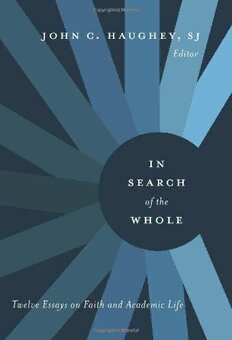
In Search of the Whole: Twelve Essays on Faith and Academic Life PDF
Preview In Search of the Whole: Twelve Essays on Faith and Academic Life
In Search of the Whole http://avaxho.me/blogs/ChrisRedfield In Search of the Whole Twelve Essays on Faith and Academic Life D John C. Haughey editor georgetown university press / washington, d.c. © 2011 Georgetown University Press. All rights reserved. No part of this book may be reproduced or utilized in any form or by any means, electronic or mechanical, including photocopying and recording, or by any information storage and retrieval system, without permission in writing from the publisher. Library of Congress Cataloging-in-Publication Data In search of the whole : twelve essays on faith and academic life / John C. Haughey, editor. p. cm. Includes bibliographical references and index. ISBN 978-1-58901-781-8 (pbk. : alk. paper) 1. Catholics—Intellectual life. 2. Christian college teachers— Religious life. I. Haughey, John C. BX1795.I57I52 2011 378'.0712—dc22 2011004080 This book is printed on acid-free paper meeting the requirements of the American National Standard for Permanence in Paper for Printed Library Materials. 15 14 13 12 11 9 8 7 6 5 4 3 2 First printing Printed in the United States of America In memory of Peter Winter, friend and benefactor Contents Preface ix Part One Whole as Task Chapter 1 Wholeness through Science, Justice, and Love, Patrick H. Byrne 3 Chapter 2 From Discovery to Risk, Cynthia Crysdale 19 Chapter 3 Professional Education as Transformation, Robert J. Deahl 37 Chapter 4 Learning to Love the Law of the Sea, William P. George 51 Chapter 5 Catholicity and Faculty Seminars, Richard M. Liddy 73 Chapter 6 The “Real World” of Business, J. Michael Stebbins 85 Part Two Whole as Identity Chapter 7 Attaining Harmony as a Hindu-Christian, Michael Amaladoss 99 Chapter 8 Arriving at a Christocentric Universe, Ilia Delio 111 Chapter 9 Le Petit Philosophe, Patrick A. Heelan 129 Chapter 10 Toward a Catholic Christianity: A Personal Narrative, Michael McCarthy 147 Chapter 11 The Hunting and the Haunting, Peter Steele 165 Chapter 12 Attaining Harmony with the Earth, Cristina Vanin 179 Epilogue 201 List of Contributors 203 Index 207 Preface Like clouds, no two of us human beings are exactly alike. This volume bears eloquent witness to this. As one reads the different chapters in this volume, one will marvel at the distinctiveness of each consciousness, at how subjectivities are even more sui generis than our unique sizes and shapes and other physical characteristics. Although not everyone is gifted at plumb- ing interiorities and putting them on paper, the twelve writers here certainly are. The result is a coming together of twelve highly defined individuals whose rich self-disclosures address the same question, one that had not been posed to them before I asked it: What is the whole you are seeking to name, confect, be? This question had its genesis in a discovery I made and articulated in Where Is Knowing Going? The Horizons of the Knowing Subject.1 Data for that study came from deeply listening to some two hundred academics address a prior question about the good they are seeking to do with their growing academic competence. I discovered that the common note in their work was making wholes. The two hundred people were taking pieces and putting them together to make meaning, connect dots, get incoherences to cohere. The point goes beyond Aristotle’s primary insight that human action is generated by a good to be done. The good when aggregated by behavior makes a virtue, when articulated by minds makes a whole. Whole-seeking, whole-making, is what the twelve authors in this volume do with what otherwise is left disassem- bled. Seven of them were members of the team I brought together to help me think through that first volume. The other five are equally entrepreneur- ial, so I invited their entries. Subjectivity, consciousness, interiority—whatever you want to call it— tends to be all over the place most of the time in most of us. But it is also always questing. Readers who are aware of this in themselves—that is, that their consciousness functions in anticipation of wholes—will be enriched by learning their similarity to these authors. We are wired to be unidirectional. I like the way the twentieth-century genius Bernard Lonergan often put this: There is an anticipation of an entirety in our seeking, thinking, choos- ing.2 Three strands are woven together in our subjectivities: One looks for being, the second for value, and the third for meaning. Together these three strands get very particular in this volume, as each author produces a unique determination of a sought-for “entirety.” Readers will see immediately that none of the twelve authors here re- peats anyone else. But after reading any selection readers will see how this ix
